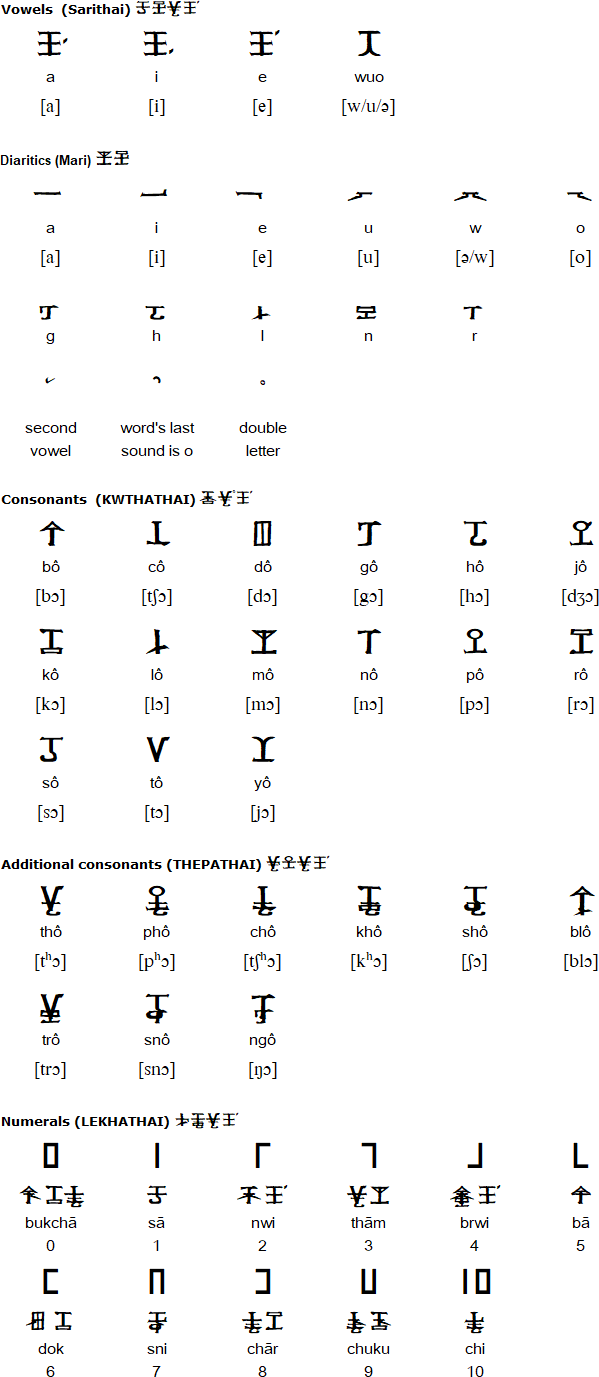The Aima script is used to write Kokborok, a Brahmaputran language spoken mainly in the India state of Tripura, and in nearby parts of Bangaldesh. The Aima script was developed by Hiralal Debbarma and was based on the ancient Koloma script. The Aima script is also known as Koloma or Kokborok script. The ancient Koloma script was used from the 1st century AD.
Today Kokborok is generally written with the Latin alphabet, and was written with the Bengali alphabet during the 19th century.

Download an alphabet chart for Aima (Excel format)

বেবাক বুরোক নাঙলাই বোরোক তেই মানথাই বাই ফুয়োকজাকৗই অছাইঅ। ব’র’ক সিমুঙ তেই রৗঙমুঙনি হামারি বাই কুপলুঙ তেই বৗতা বুফেয়ুঙ কৗথামুঙনি উানসুকমুঙ বাই খরোকসা তেই খোরোকসানো ছুবালাইনা নাঙগো।
Bebak borok nanglai borom tei manthai baih phiyokjakgwi achaio. Bohrok simung tei rwngmungni hamari baih kuplung tei bwta-buphayung kwthamungni wansukmung baih khoroksa tei khoroksano chubalaina nango.
All human beings are born free and equal in dignity and rights. They are endowed with reason and conscience and should act towards one another in a spirit of brotherhood.
(Article 1 of the Universal Declaration of Human Rights)
Details supplied by Biswajit Mandal (biswajitmandal[dot]bm90[at]gmail[dot]com) and Khapang Debbarma
Information about the Aima script
https://en.wikipedia.org/wiki/Kokborok#Script
https://en.wikipedia.org/wiki/Script_issues_of_Kokborok
https://www.facebook.com/kokborokscriptin-1534253960195425/
Ahom, Aima, Arleng, Badagu, Badlit, Basahan, Balinese, Balti-A, Balti-B, Batak, Baybayin, Bengali, Bhaiksuki, Bhujimol, Bilang-bilang, Bima, Blackfoot, Brahmi, Buhid, Burmese, Carrier, Chakma, Cham, Cree, Dehong Dai, Devanagari, Dham Lipi, Dhankari / Sirmauri, Ditema, Dives Akuru, Dogra, Ethiopic, Evēla Akuru, Fox, Fraser, Gond, Goykanadi, Grantha, Gujarati, Gunjala Gondi, Gupta, Gurmukhi, Halbi Lipi, Hanifi, Hanuno'o, Hočąk, Ibalnan, Incung, Inuktitut, Jaunsari Takri, Javanese, Kaithi, Kadamba, Kamarupi, Kannada, Kawi, Kharosthi, Khema, Khe Prih, Khmer, Khojki, Khudabadi, Kirat Rai, Kōchi, Kodava Lipi, Komering, Kulitan, Kurukh Banna, Lampung, Lanna, Lao, Lepcha, Limbu, Lontara/Makasar, Lota Ende, Magar Akkha, Mahajani, Malayalam, Meitei (Modern), Manpuri (Old), Marchen, Meetei Yelhou Mayek, Meroïtic, Masarm Gondi, Modi, Mon, Mongolian Horizontal Square Script, Multani, Nandinagari, Newa, New Tai Lue, Ojibwe, Odia, Ogan, Pahawh Hmong, Pallava, Phags-pa, Purva Licchavi, Qiang / Rma, Ranjana, Rejang (Kaganga), Sasak, Savara, Satera Jontal, Shan, Sharda, Sheek Bakrii Saphaloo, Siddham, Sinhala, Sorang Sompeng, Sourashtra, Soyombo, Sukhothai, Sundanese, Syloti Nagri, Tagbanwa, Tai Noi, Takri, Tamil, Tanchangya (Ka-Pat), Tani, Thaana, Telugu, Thai, Tibetan, Tigalari, Tikamuli, Tocharian, Tolong Siki, Vatteluttu, Warang Citi
Page last modified: 16.03.23
[top]
You can support this site by Buying Me A Coffee, and if you like what you see on this page, you can use the buttons below to share it with people you know.

If you like this site and find it useful, you can support it by making a donation via PayPal or Patreon, or by contributing in other ways. Omniglot is how I make my living.
Note: all links on this site to Amazon.com, Amazon.co.uk
and Amazon.fr
are affiliate links. This means I earn a commission if you click on any of them and buy something. So by clicking on these links you can help to support this site.
[top]